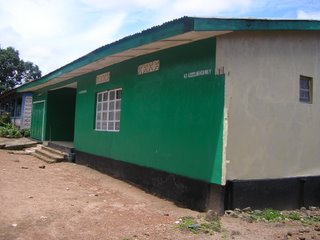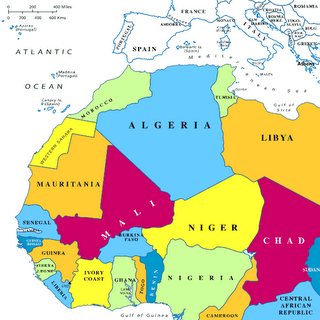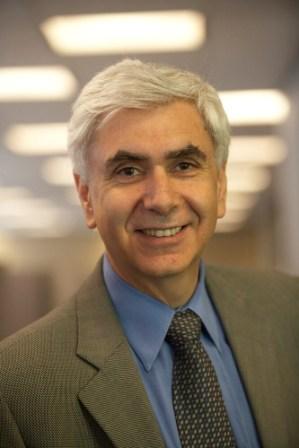Friday, September 29, 2006
My house in Makeni

Alice Lahai is the VSO manager in Freetown and she very kindly snapped a photo of my house while visiting Makeni. The garden looks a little forelorn but the house looks better than a mud hut. Even a garage for my bike?
Sunday, September 10, 2006
Comparison table
Thursday, September 07, 2006
Photo
Who, What Why Where and When
 I hear that you are going overseas as a volunteer real estate valuation expert.
I hear that you are going overseas as a volunteer real estate valuation expert.Yes, I have accepted a placement in Sierra Leone, a third world developing country located in western Africa. The 6 month job involves assisting with the valuation of properties for local assessment and taxation purposes. I start with some training in October and expect to be in Sierra Leone later in the month, returning in May 2007. The placement is being co-ordinated through the Voluntary Services Overseas (VSO), an international development agency who assist developing countries by placing volunteers under a program of skills sharing. www.vsocan.org
Can you tell me something about Sierra Leone ?
Sierra Leone is located on the west coast of Africa close to the equator - see maps above and below. Your “Google Earth” should find it http://earth.google.com/earth4.html. The country has a population of just over 6 Million who suffer from extreme poverty as well as HIV / AIDS. A significant factor contributing to economic conditions is most significantly the long civil war, which lasted for a 10 years - only ending in 2001, when a UN peacekeeping mission was mandated. Since 2001 the country has had a relatively stable period and efforts to improve have been made, assisted most significantly by the international community with grants and debt reduction programs.
Sierra Leone is an extremely poor African nation, with economic conditions characterized by tremendous inequality in income distribution. While it possesses substantial mineral, agricultural and fishery resources, its economic and social infrastructure is not well developed. Serious social disorders continue to hamper economic development. The fate of the economy depends upon the maintenance of domestic peace and the continued receipt of substantial aid from abroad, which is essential to offset the severe trade imbalance and supplement government revenues. The IMF has completed a Poverty Reduction and Growth Facility program that helped stabilize economic growth and reduce inflation. A recent increase in political stability has led to a revival of economic activity, such as the rehabilitation of bauxite mining.
Some key comparative facts emphasize the current situation. The comparative table on a more recent post is startling. I havnt been able to bring it into this post.
Where will you be working ?
Makeni, a town about 3 hours east of the capital Freetown. Makeni is the principal headquarters for the Northern Province and is a market and commercial town of 120,000 people. It is reported by other volunteers as a pleasant town with high international (UN) and local NGO presence. Most of the organisations however operate outside the township. The VSO cautions me however that …..there is no main water or electricity supply in Makeni. Water is drawn from wells and is safe if boiled and filtered. There are shops where the volunteer can get the basic commodities including bottled natural spring water. There are few recreational and social centres and restaurants. Oh well I wasnt going for a vacation but for the experience.
What is involved in your work?
My work involves creating a valuation system for property assessment as well as training local people to maintain this on an ongoing basis. At the current time there is a very rudimentary assessment made on all properties in Makeni but the Chairman of the Council complains that it does not function since the rate payers perceive the current system as unfair. The main reasons are that the valuations are incomplete and do not reflect a fair distribution of the burden. The aim is to eventually raise the effective collection rate and broaden the tax base.
Property tax is seen as an efficient and effective means to mobilize local government revenues and granting agencies such as IMF encourage this activity as a condition of specific programs. I suspect that this is the driver of my placement. The sequence of property tax administration is broken down into 5 steps, Discovery, Valuation, Assessment, Billing and Collection but my role is limited to the second step since this employs my expertise. However I expect that the first part, the discovery and capture of a more comprehensive range of properties will also be needed following guidance from the community in Makeni. The goal is to set up a sustainable and more accurate method of expanding the current system of municipal taxation.
Preparation
I have been preparing by studying a vast number of papers, and I have discussed this subject with mainly Canadian based experts including those at Altus Group. Dave Gibson and Robert Dorion who have been most helpful, as well as others at MPAC. There have been many papers written on the subject of Urban Tax Reform for institutions such as the World Bank, University of Toronto, Lincoln Institute of Land Policy, Amercian Journal of economics, Harvard Institute for International Development etc. Background that I have found interesting and stimulating is the Hernando de Soto work published as The Mystery of Capital and Jeffrey Sachs, the end of Poverty. Lastly I have found the VSO itself to be a vast resource and their training systems are excellent at helping the volunteer carry out the required research. Whilst this is a new field of valuation for me I feel as though I have a good grasp of the work and I look forward to this interesting challenge.
Isnt it dangerous to live in countries like Sierra Leone?
The plain answer is that there are dangers that are rather different than those in first world countries like Canada and great care and considerable awareness is needed. Health care in Sierra Leone is poor and social issues need to be understood. The development agency VSO have given me the confidence that volunteers have a reasonable standard of living, clean water and have an opportunity for a healthy diet. They certainly do not appear to send volunteers into situations that are not manageable and I am impressed with their 50 years of experience with 30,000 volunteers.
Living and working in the developing world, where conditions may be fairly basic, demands a certain level of physical and psychological fitness whilst health is clearly of paramount importance. In my training this month a full session was given by a tropical diseases doctor and a complex range of medical vaccinations and prophylaxes were described. Then a further full day at the tropical diseases clinic in Toronto was spent with specialised doctors and advisors. I have had a full range of jabs and will have half of my baggage taken up with supplies such as bed nets, pills and other first aid equipment.
Certainly personal safety is a concern but risks seem to be very manageable and there seems to be good support from the VSO staff in the country as well as other volunteers living close by.
Understanding social issues are a key feature of a successful placement and much was made of this during my 3 day training sessions in Ottawa. Culture was a central theme and an appreciation of history and it’s impact was taught. Practical problem solving situations had to be handled in class and gave me an important awareness. A common thread to the training was that a volunteer can do more harm than good without a full appreciation of the culture and how to operate within it.
How did you get the volunteer placement
I made an application to Voluntary Services Overseas (VSO) an international development agency that works entirely through volunteers. Having made a decision to volunteer some time in a third world country Sierra Leone is an extremely poor African nation, with economic conditions characterized by tremendous inequality in income distribution. While it possesses substantial mineral, agricultural and fishery resources, its economic and social infrastructure is not well developed. Serious social disorders continue to hamper economic development. The fate of the economy depends upon the maintenance of domestic peace and the continued receipt of substantial aid from abroad, which is essential to offset the severe trade imbalance and supplement government revenues. The IMF has completed a Poverty Reduction and Growth Facility program that helped stabilize economic growth and reduce inflation. A recent increase in political stability has led to a revival of economic activity, such as the rehabilitation of bauxite mining.
VSO Canada recruits, trains and matches volunteers from North America to placements that meet the requests of their overseas partners. VSO volunteers work in partnership with people in more than 30 developing countries, contributing to development goals in various areas; Education, HIV and AIDS, Disability, Health and Social Well-being, Secure Livelihoods and Participation and Governance. I have been recruited in the area of Governance
The organization is described in full at http://www.vsocanada.ca/ .The organization is a registered charity although it receives funding in part from the Canadian Investment and Development Agency (CIDA). I have been impressed with the organization and as part of my placement I would like the support of donations from others to help fund VSO as well.
http://www.vsocan.org/display.aspx?pid=499&cid=705
How will you stay in touch with family and friends back home
Electronic communications are advancing rapidly in all African countries although it is a little behind the times in Sierra Leone. Wireless telephone communication is available much more so than land lines. Internet service for e-mail is very sporadic but I am hopeful that I can maintain a blog.
Why did you want to do this in the face of such harsh living conditions, difficult working conditions, as well as leaving your family and work for such a long period ?
I’ll do anything to escape the Canadian winter months. Seriously though like most of us I have always felt a certain appreciation for what we have in Canada and somewhat of an appreciation of third world poverty issues through traditional media programmes, television, newspapers etc. I have also been most impressed with Stephen Lewis and his work as the UN special envoy for AIDS. Through all of this background we as Canadians can see that our own health, environment and economic well-being are increasingly affected by events that often take root in the poverty of developing countries.
Having read quite a lot of background I have come to appreciate that the cause of poverty in African countries is not solely local Governments and their obvious corruption, nor the ethnic strife of the population. In fact much of the problem has been caused perhaps unwittingly by those of us in the “developed world”. Just one direct example is that during the civil conflict Canadian companies bought diamonds which originated in Sierra Leone and revenue from these diamonds found their way into the hands of armed groups.
I have become more engaged over the past few years since I have had an opportunity to travel to sub-Saharan Africa, Tanzania, Kenya, South Africa, Lesotho and Namibia and I have seen first hand some of the very difficult issues. I am certainly more interested in these issues today and I feel that we in the first world can certainly be effective at promoting change.
My daughter Suzanne has taken up a career interest in Political Science, now having a Masters Degree, and she and I have often debated the issues. I have been both stimulated and enlightened. I have become less cynical and more understanding of the cycle of poverty that needs to be ended and needs help from us living in the developed world to break. Suzanne emphasises that not only can we help by offering advice and expertise, but we can also gain valuable insights and suggestions from those most affected by poverty who have a great deal to teach about potential solutions and changes which need to occur in the developed world and the developing (third) world.
Lastly, at 55 years old, I find myself at a life stage where I am able to explore such a personal ambition. My children are old enough to take care of themselves. I am, thankfully, healthy and still reasonably lucid. And, after many years of rapid growth, Altus Group has matured and evolved to a point where the principals can both understand and support this undertaking.
The placement in Sierra Leone involves adapting my experience and work skills and all of the issues of my particular life stage seem to come together just at the moment. That is why I think the time is right for me to participate.


